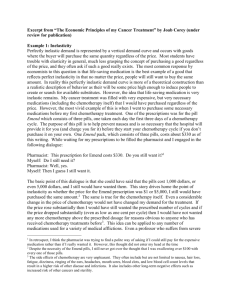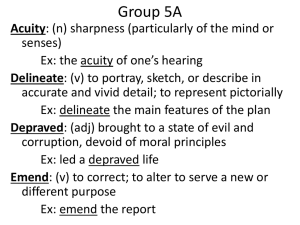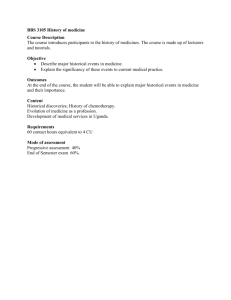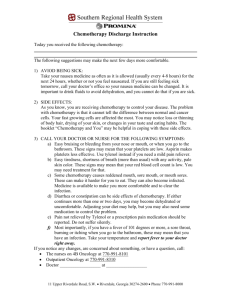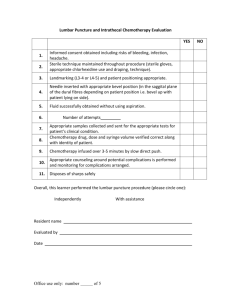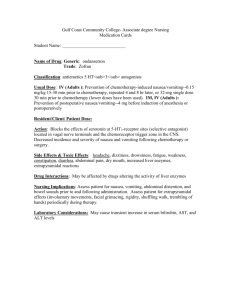Patient Information EMEND® (EE mend)
advertisement
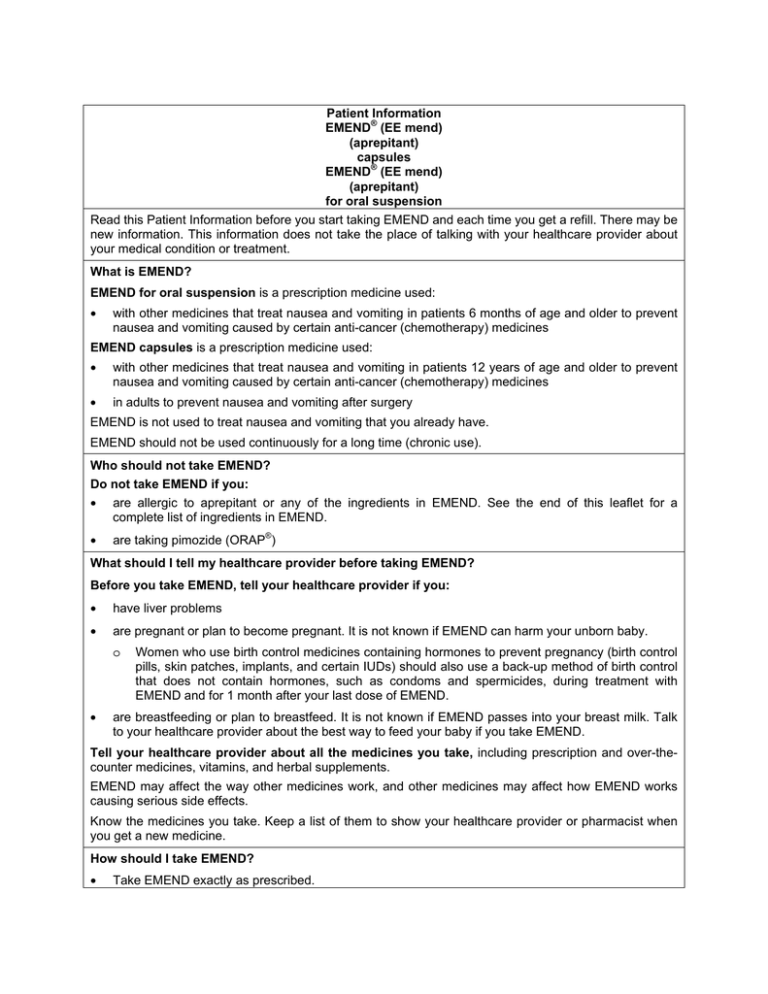
Patient Information EMEND® (EE mend) (aprepitant) capsules EMEND® (EE mend) (aprepitant) for oral suspension Read this Patient Information before you start taking EMEND and each time you get a refill. There may be new information. This information does not take the place of talking with your healthcare provider about your medical condition or treatment. What is EMEND? EMEND for oral suspension is a prescription medicine used: • with other medicines that treat nausea and vomiting in patients 6 months of age and older to prevent nausea and vomiting caused by certain anti-cancer (chemotherapy) medicines EMEND capsules is a prescription medicine used: • with other medicines that treat nausea and vomiting in patients 12 years of age and older to prevent nausea and vomiting caused by certain anti-cancer (chemotherapy) medicines • in adults to prevent nausea and vomiting after surgery EMEND is not used to treat nausea and vomiting that you already have. EMEND should not be used continuously for a long time (chronic use). Who should not take EMEND? Do not take EMEND if you: • are allergic to aprepitant or any of the ingredients in EMEND. See the end of this leaflet for a complete list of ingredients in EMEND. • are taking pimozide (ORAP®) What should I tell my healthcare provider before taking EMEND? Before you take EMEND, tell your healthcare provider if you: • have liver problems • are pregnant or plan to become pregnant. It is not known if EMEND can harm your unborn baby. o • Women who use birth control medicines containing hormones to prevent pregnancy (birth control pills, skin patches, implants, and certain IUDs) should also use a back-up method of birth control that does not contain hormones, such as condoms and spermicides, during treatment with EMEND and for 1 month after your last dose of EMEND. are breastfeeding or plan to breastfeed. It is not known if EMEND passes into your breast milk. Talk to your healthcare provider about the best way to feed your baby if you take EMEND. Tell your healthcare provider about all the medicines you take, including prescription and over-thecounter medicines, vitamins, and herbal supplements. EMEND may affect the way other medicines work, and other medicines may affect how EMEND works causing serious side effects. Know the medicines you take. Keep a list of them to show your healthcare provider or pharmacist when you get a new medicine. How should I take EMEND? • Take EMEND exactly as prescribed. • • • • • Swallow EMEND capsules whole. If you are receiving chemotherapy, EMEND may be taken with or without food. If you take too much EMEND, call your healthcare provider, or go to the nearest hospital emergency room. If you are receiving cancer chemotherapy, EMEND is taken as 3 doses over 3 days - starting on the day you have chemotherapy, and for the following 2 days. In adults who are receiving chemotherapy, there are 2 ways your healthcare provider may prescribe EMEND for you: 1. Capsules of EMEND by mouth for all 3 doses: o You should get a package that has 3 capsules of EMEND. o Day 1 (Day of chemotherapy): Take one 125 mg capsule of EMEND (white and pink) by mouth 1 hour before you start your chemotherapy treatment. o Day 2 and Day 3: Take one 80 mg capsule of EMEND (white) by mouth 1 hour before you start your chemotherapy treatment. If no chemotherapy treatment is given on Days 2 and 3, EMEND should be taken in the morning. 2. Oral suspension of EMEND by mouth for all 3 doses, for adults who are not able to swallow capsules: o For each dose of EMEND for oral suspension, you will get a pre-filled oral dosing dispenser that contains your prescribed dose. o See the detailed Instructions for Use that comes with EMEND for oral suspension for information about the correct way to take a dose of EMEND for oral suspension. If you have questions about how to take EMEND for oral suspension, talk to your healthcare provider. o Day 1 (Day of chemotherapy): Take 1 dose of EMEND for oral suspension by mouth 1 hour before you start your chemotherapy treatment. o Day 2 and Day 3: Take 1 dose of EMEND for oral suspension by mouth 1 hour before you start your chemotherapy treatment. If no chemotherapy treatment is given on Days 2 and 3, EMEND for oral suspension should be taken in the morning. • • In children 12 years of age and older, who can swallow capsules by mouth, and who are receiving chemotherapy, EMEND is prescribed as capsules of EMEND by mouth for all 3 doses: o You should get a package that has 3 capsules of EMEND. o Day 1 (Day of chemotherapy): Take one 125 mg capsule of EMEND (white and pink) by mouth 1 hour before you start your chemotherapy treatment. o Day 2 and Day 3: Take one 80 mg capsule of EMEND (white) by mouth 1 hour before you start your chemotherapy treatment. If no chemotherapy treatment is given on Days 2 and 3, EMEND should be taken in the morning. In children 6 months to less than 12 years of age who are receiving chemotherapy, or in children 12 years of age and older who are not able to swallow capsules and who are receiving chemotherapy, EMEND is prescribed as oral suspension of EMEND by mouth for all 3 doses: o For each dose of EMEND, you will get a pre-filled oral dosing dispenser that contains your child’s prescribed dose. o See the detailed Instructions for Use that comes with EMEND for oral suspension, for information about the correct way to give a dose of EMEND for oral suspension. If you have questions about how to give EMEND for oral suspension, talk to your child’s healthcare provider. o Day 1 (Day of chemotherapy): Give 1 dose of EMEND for oral suspension to your child by mouth 1 hour before they start their chemotherapy treatment. o Day 2 and Day 3: Give 1 dose of EMEND for oral suspension to your child by mouth 1 hour before they start their chemotherapy treatment. If no chemotherapy treatment is given on 2 Days 2 and 3, EMEND should be given in the morning. • If you are an adult and are having surgery: o Your healthcare provider will prescribe a 40 mg capsule of EMEND for you before surgery. Take EMEND within 3 hours before surgery. o • Follow your healthcare provider’s instructions about restrictions on eating and drinking before surgery. If you take the blood thinner medicine warfarin sodium (COUMADIN®, JANTOVEN®), your healthcare provider may do blood tests after you take EMEND to check your blood clotting. What are the possible side effects of EMEND? • In adults taking EMEND to prevent nausea and vomiting caused by chemotherapy, the most common side effects include tiredness, diarrhea, weakness, indigestion, stomach (abdominal) pain, hiccups, decrease in white blood cell count, dehydration, and changes in liver function tests. • In adults taking EMEND to prevent nausea and vomiting after surgery, the most common side effects include constipation and low blood pressure (hypotension). • In children 6 months to 17 years of age, who are taking EMEND to prevent nausea and vomiting caused by chemotherapy, the most common side effects include decrease in white blood cell count, headache, diarrhea, decreased appetite, cough, tiredness, decrease in red blood cell count, dizziness, and hiccups. Tell your healthcare provider if you have any side effect that bothers you or that does not go away. These are not all of the possible side effects of EMEND. For more information ask your healthcare provider or pharmacist. Call your healthcare provider for medical advice about side effects. You may report side effects to FDA at 1-800-FDA-1088. How should I store EMEND? EMEND capsules • Store EMEND capsules at room temperature, between 68°F to 77°F (20°C to 25°C). EMEND for oral suspension • • • Store EMEND for oral suspension in the refrigerator, between 36°F to 46°F (2°C to 8°C). Use EMEND for oral suspension within 2 days of getting the medicine from your healthcare provider. When ready to use, EMEND for oral suspension can be kept at room temperature, between 68°F to 77°F (20°C to 25°C) for up to 3 hours. Keep EMEND and all medicines out of the reach of children. General information about the safe and effective use of EMEND Medicines are sometimes prescribed for purposes other than those listed in a Patient Information leaflet. Do not use EMEND for a condition for which it was not prescribed. Do not give EMEND to other people, even if they have the same symptoms you have. It may harm them. You can ask your healthcare provider or pharmacist for information about EMEND that is written for health professionals. For more information about EMEND call 1-800-622-4477 or go to www.emend.com. What are the ingredients in EMEND? EMEND capsules: Active ingredient: aprepitant Inactive ingredients: sucrose, microcrystalline cellulose, hydroxypropyl cellulose and sodium lauryl sulfate. The capsule shell excipients are gelatin, titanium dioxide, and may contain sodium lauryl sulfate and silicon dioxide. The 125 mg capsule shell also contains red ferric oxide and yellow ferric oxide. The 40 mg capsule shell also contains yellow ferric oxide. EMEND for oral suspension: 3 Active ingredient: aprepitant Inactive ingredients: sucrose, lactose, hydroxypropyl cellulose, sodium lauryl sulfate, red iron oxide, and sodium stearyl fumarate. Distributed by: Merck Sharp & Dohme Corp., a subsidiary of MERCK & CO., INC., Whitehouse Station, NJ 08889, USA For patent information: www.merck.com/product/patent/home.html The brands listed in the above sections “Who should not take EMEND?” and “How should I take EMEND?” are the registered trademarks of their respective owners and are not trademarks of Merck Sharp & Dohme Corp., a subsidiary of Merck & Co., Inc. Copyright © 2003-2015 Merck Sharp & Dohme Corp., a subsidiary of Merck & Co., Inc. All rights reserved. usppi-mk0869-mf-1512r006 This Patient Information has been approved by the U.S. Food and Drug Administration. Revised: December 2015 4
